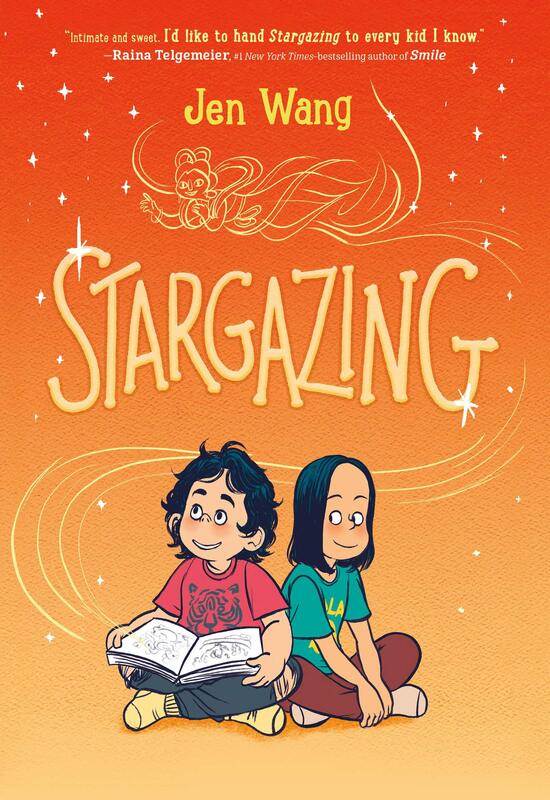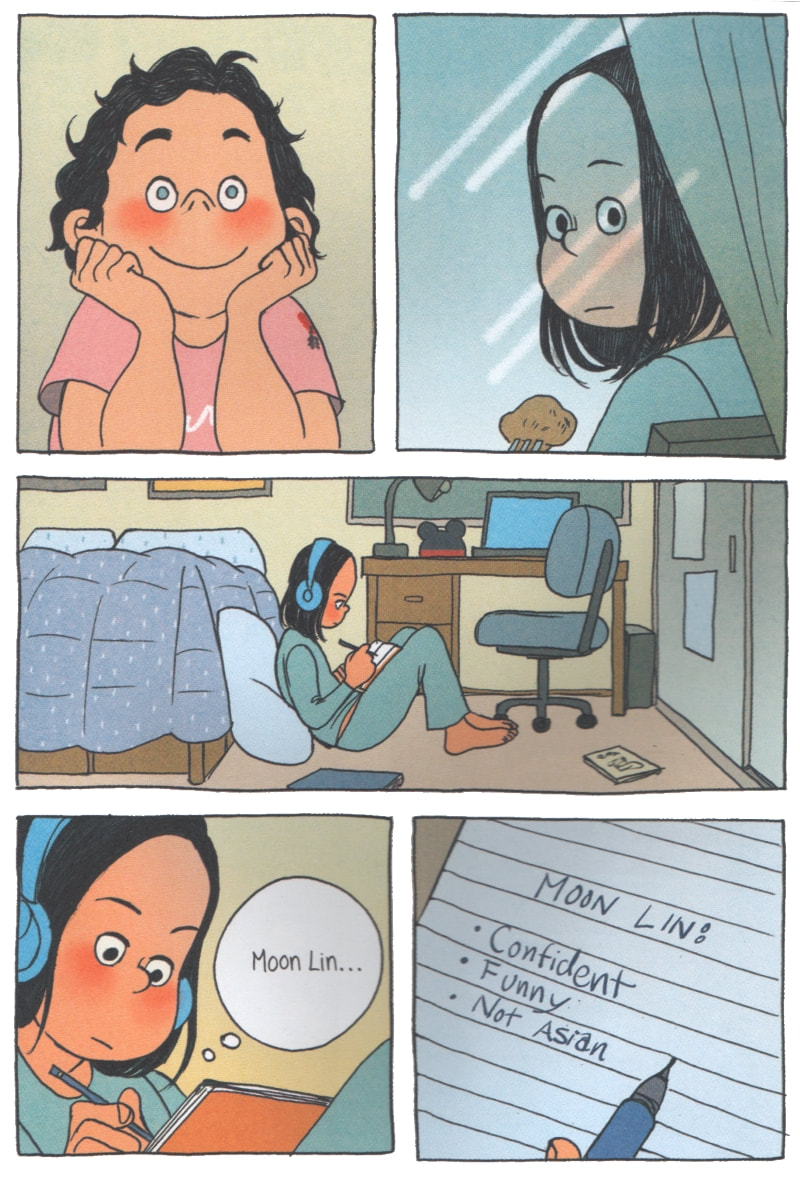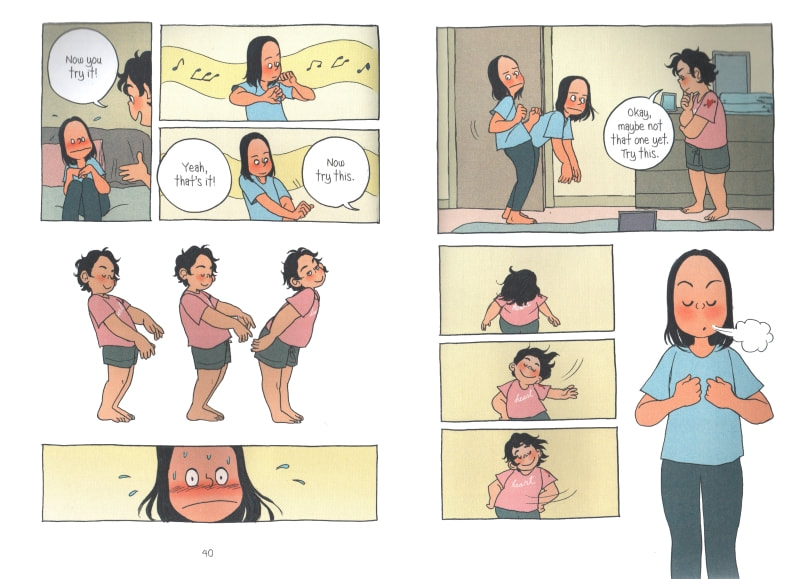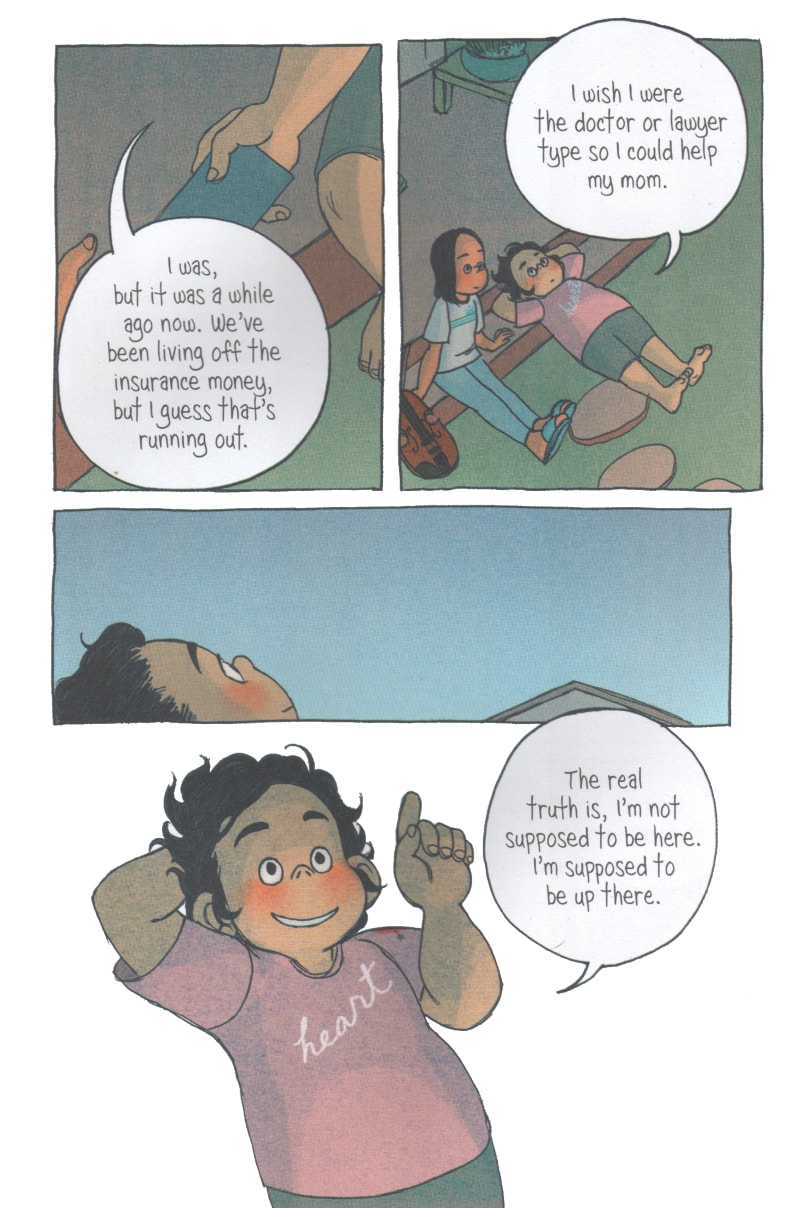|
Stargazing. By Jen Wang. Color by Lark Pien. Song lyrics by Hellen Jo. First Second. ISBN 978-1250183880 (softcover), $12.99; ISBN 978-1250183873 (hardcover), $21.99. 224 pages. Stargazing, Jen Wang’s follow-up to last year’s The Prince and the Dressmaker, is recognizably by the same artist—one of America’s best comics artists. Yet it’s a very different sort of book. A middle-grade graphic novel about friendship and jealousy among girls, it falls squarely into Raina Telgemeier territory: a school story about finding your complementary opposite and becoming friends, but then pulling back, but then stepping forward again. As it traces a relationship between two girls, Christine and Moon, Stargazing evokes the camaraderie and intimacy of friends sharing secrets. At the same time, it registers how selfishness and anxiety may complicate our friendships. Wang treats small betrayals among school friends as the stuff of moral drama. In particular, she pays attention to what it may mean to be an immigrant’s daughter driven by certain dreams of success, and how such a driven child might look to another girl, one far from her in class and temperament, for a kind of relief, a liberating counter-example of a life lived more freely or less anxiously. But of course that “other” girl has complications of her own. Along the way, Wang conveys differences of class and circumstance within a Chinese American community, showing how adaptation and resistance may take diverse forms. Building on her own memories of girlhood, and detailing how different families may cleave to different standards and impose different pressures, Wang fashions a portrait of community and an understated story of girlhood friendship with a very particular cultural setting. In short, this is a terrific book. Female friendship is a, or maybe the, abiding theme in post-Raina graphic Bildungsromane. I’ve noticed various author-artists tacking in that direction (KinderComics readers may recall, for example, reviews of Larson’s All Summer Long or Brosgol’s Be Prepared). At the recent PAMLA conference in San Diego, scholar Erika Travis (California Baptist University) presented on this very topic, drawing on Jamieson’s Roller Girl, Bell’s El Deafo, and Hale and Pham’s Real Friends for examples. She showed how these books stake out the traditional concerns of girls’ middle-grade books, only in comics form. Stargazing leans in that direction too—it’s the simplest, most grounded of Wang’s books, harking back to the slice-of-life of Koko Be Good but framed as a school story. Thematically, it invites comparison to Telegemeier’s recent Guts; for example, in both books characters use their art to cement relationships. Stargazing, though, shoulders the added complexity of immigrants’ children in a specific Chinese American context. Its protagonist is weighed down by her father’s aspirations for success—perhaps an oblique commentary on the model minority myth—and this complicates, almost undermines, her friendship with her complementary opposite. Christine, studious, high-achieving, and serious, contrasts sharply with her new neighbor Moon, impetuous, high-spirited, and hyper. The former is quiet and restrained, and driven to academic success—partly by her well-meaning but at times insensitive father. The latter is a spitfire: bright and scattered, cheerfully defiant of rules, and prone to cold-cock other kids who are mean to her friends. Christine is the idealized academic success, Moon the subject of nervous gossip. Christine’s family is well-off; Moon’s single mother struggles to make ends meet. When Moon and her mother move into the guest home rented out by Christine’s family, the two girls strike up an unlikely friendship, and Moon’s energy rubs off on Christine, whose reserve begins to melt a bit. Moon introduces Christine to K-pop and dance. Christine’s family introduces Moon to Chinese language class (but it doesn’t take). The two bond, in a series of delightful scenes. Moon confesses to Christine her belief that she, Moon, is not an ordinary Earth girl but rather a creature from the stars—that one day she will return to a home on high. Sharing this with Christine is a gesture of friendship. Christine, though, prompted by anxieties about academic success and social approval, backs away from that friendship. A small betrayal bumps up against a major crisis, as Moon has to face a serious, life-altering event—and Christine, dogged by guilt, has to own her past behavior and, somehow, move forward. She struggles. She hides. But hiding can't last forever. This outwardly simple plot is treated with the utmost delicacy, and a great many insinuating cultural details that enrich the context. More to the point, its resolution is moving: every time I reopen the book I get choked up. Wang is that good. While Stargazing may be in, broadly speaking, familiar territory, it isn’t generic at all. It seems to be a dialogue around Chinese American experience and different ways of being a Chinese American girl. It evokes specific familial and communal settings with a brilliant economy. At the same time, it’s aesthetically gorgeous: Wang’s cartooning and layouts boast an elegance and lightness of touch that are rare. The book’s use of negative space—of unenclosed figures and the whiteness of the page—gives it a free-breathing, eminently readable quality. The same delicacy with character and emotion seen in The Prince and the Dressmaker comes through here, abundantly; Wang knows how to capture the finest nuances of expression. This is simply first-rate comics—and highly recommended.
1 Comment
|
Archives
June 2024
|





 RSS Feed
RSS Feed
